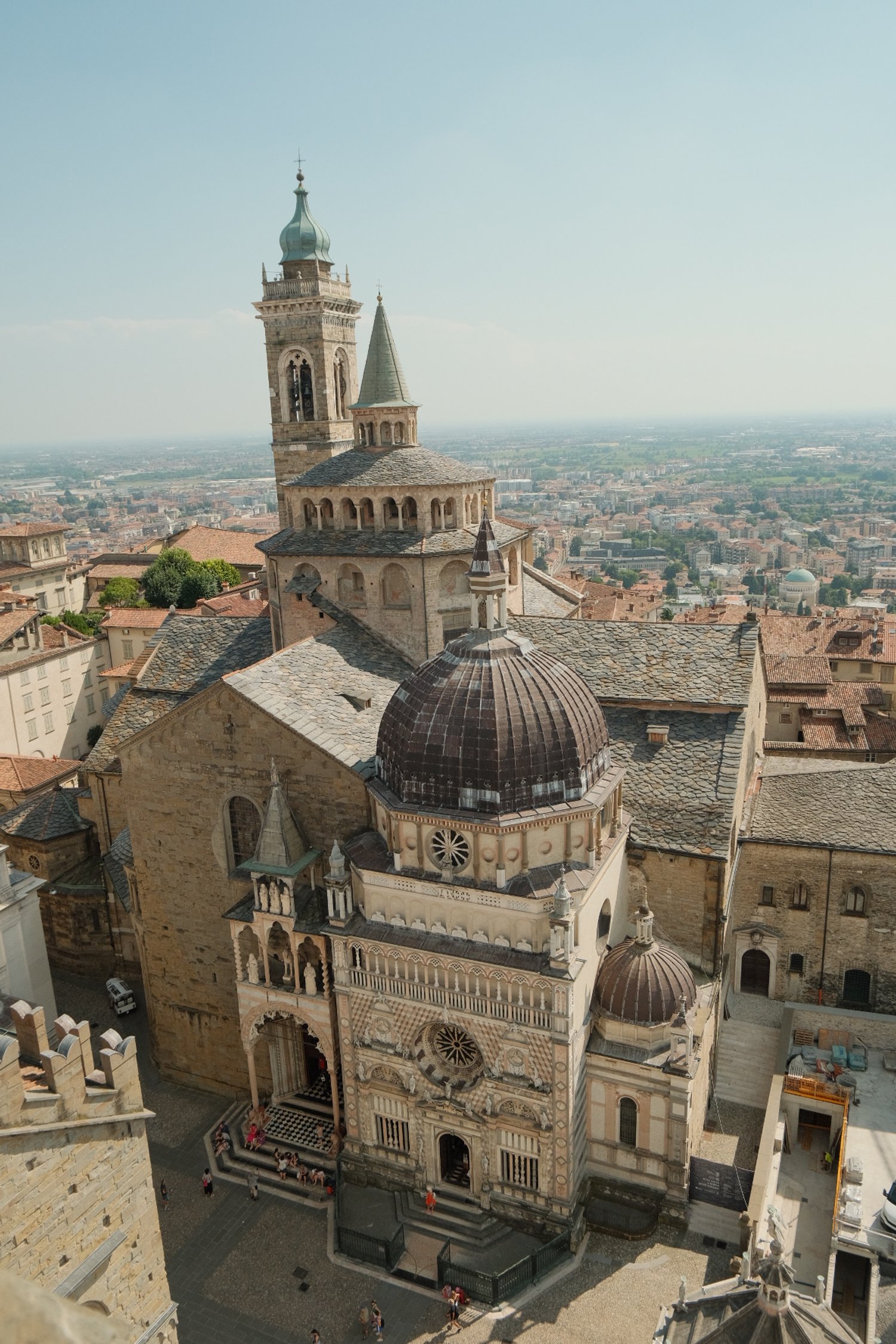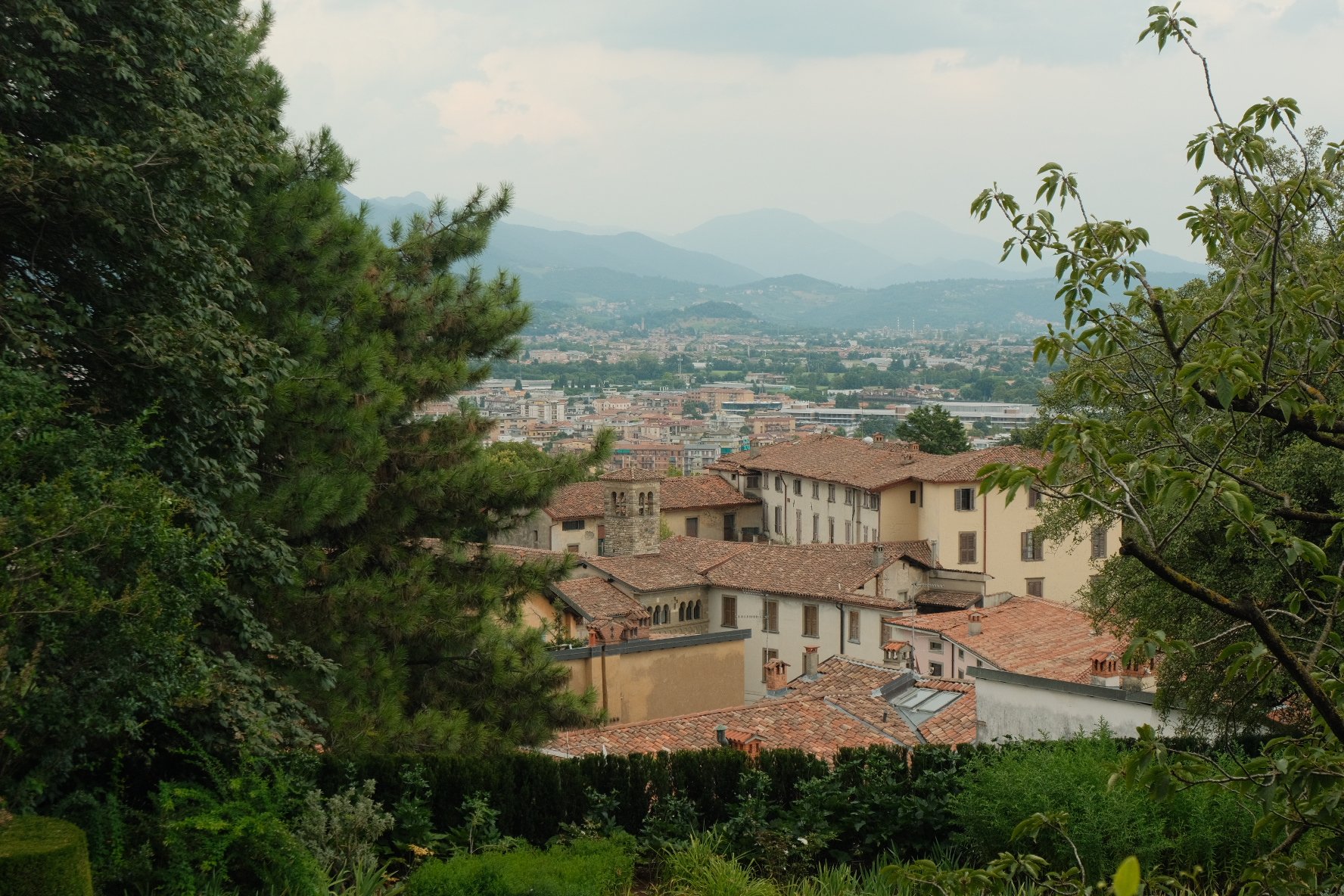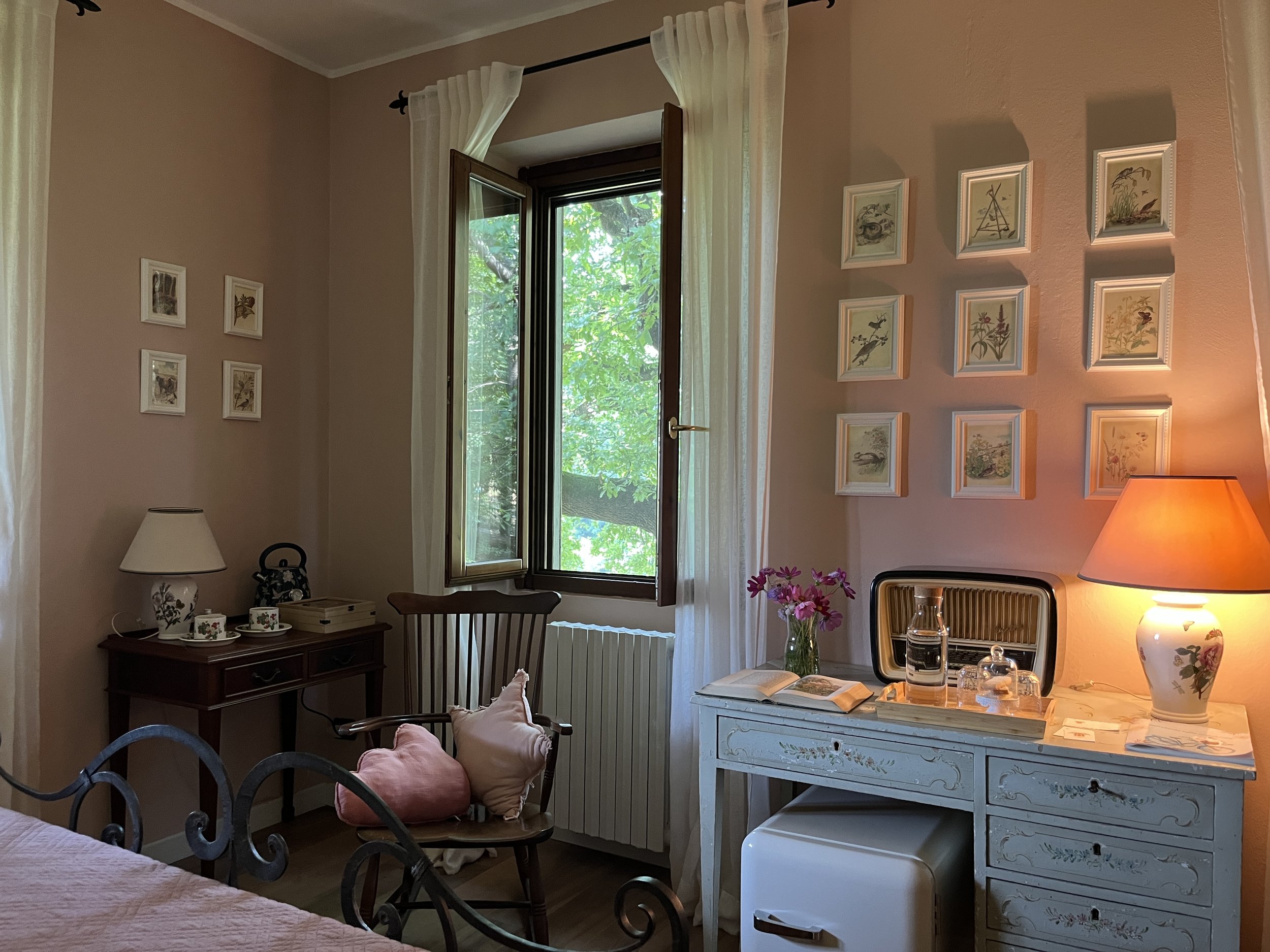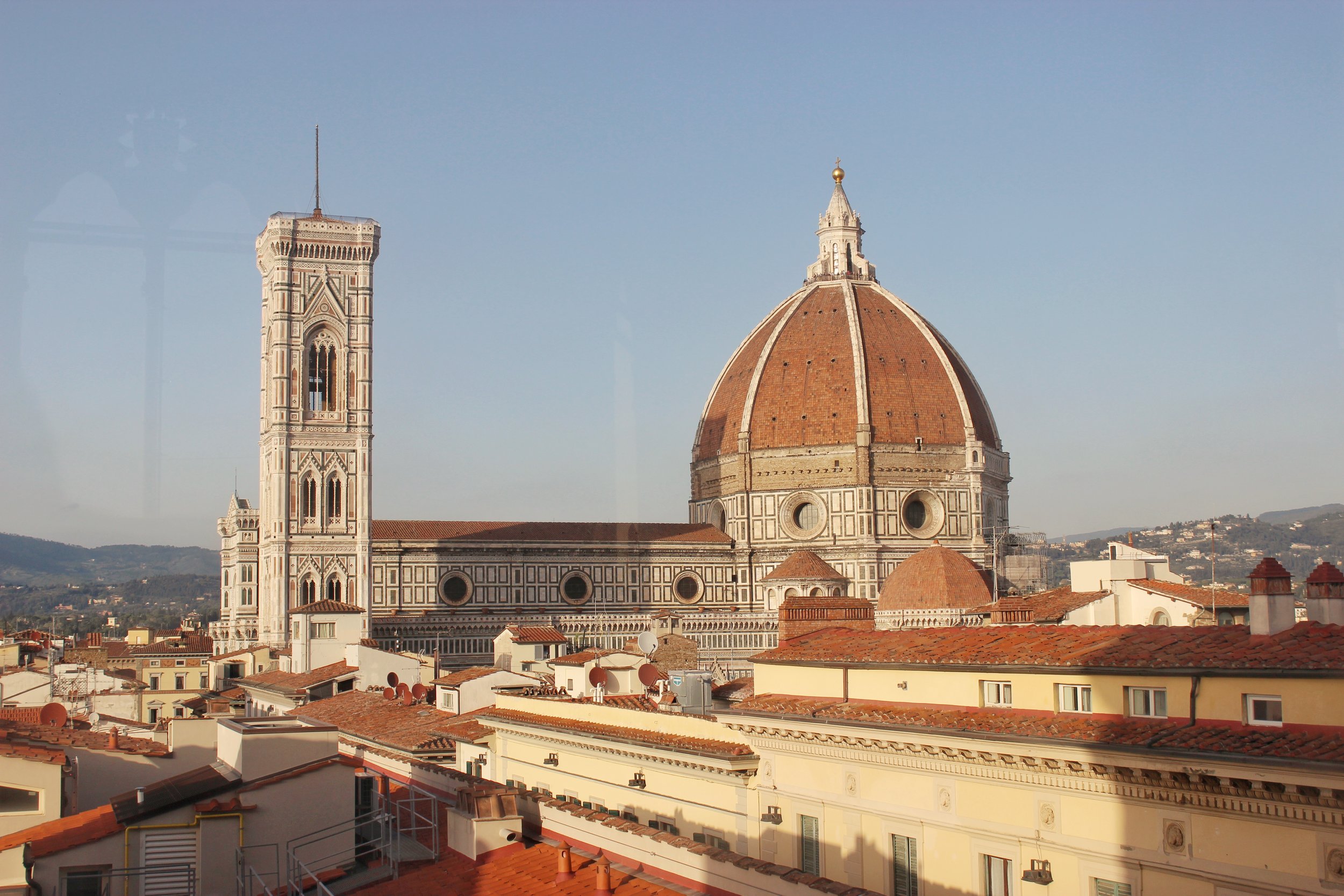The best things to do in Bergamo, Italy: an underrated gem
Disclosure: This post contains affiliate links. I earn a small commission on every purchase made at no extra cost to you.
Bergamo, located in Lombardy, Italy, is often overshadowed by nearby Milan and glamorous Lake Como. It features two parts: the Città Alta (Upper Town) with medieval architecture and the Città Bassa (Lower Town) vibrant with shops and cafés.
I first visited Bergamo by accident, and I’m curious how many others have a similar experience to me. I was cluelessly travelling through Europe as a 20 year old and booked a trip to Milan (I thought) with friends. We flew into Milan Bergamo Airport (BGY) and booked an airbnb in a local ex-monastery in the middle of a vineyard. Turns out that the property was owned by several local young men, who eagerly picked up a group of girls from the airport, and showed us around the incredible city we didn’t realise we had flown into. We never made it to Milan on that trip because the trains didn’t run that weekend, but just as well — my memories of this magical city were enough to bring me back again.
Is Bergamo worth visiting?
Yes, very much so, and I think it’s one of the most underrated cities in Italy.
Bergamo’s rich history includes influences from the Romans and Venetians, evident in landmarks like Piazza Vecchia and old city walls. Full of Italian charm but not nearly as many crowds as other comparable Italian cities, Bergamo is a hidden gem and offers stunning views and delicious local cuisine. It’s a blend of everything I want from Italy: food, charming streets, and picturesque views.
Bergamo is easy to visit in one day, such as on aday trip from Milan, but I do recommend staying there for at least one night and exploring the city in more depth.
I recently visited Bergamo as part of a trip to Lake Como and nearby San Pellegrino (for the incredible spa) and spent a couple of days in the beautiful Città Alta. San Pellegrino was one of the highlights of my trip, so do check it out as a day trip from Bergamo.
As an art historian, I have a particular interest in the historic aesthetic and cultural heritage of the places I travel, so this was my focus. Here are the best things to do in Bergamo:
Take the funicular to the Città Alta
I’m going to start off this article with my most important piece of advice about Bergamo: don’t walk up to the old city! That hill does not get any smaller once you start walking up it. It’s not impossible, but it is much further, steeper and longer than you are expecting, and especially in the summer there is a much easier way. Take the funicular!
Only about 1.70 euro, the funicular is a quick ride up to the top of the Città Alta and offers incredible views as well. There’s also a bit of novelty about the retro funicular cars and stations. I would have saved myself 30 mins, lots of sweat and some tears the first time I went to the old city if I had taken the funicular.
Bergamo: 2.5-Hour Private Upper Town Tour
And then take the San Vigilio funicular
Lesser known than the main funicular ride, there is also a second funicular route to San Vigilio, an even higher viewpoint that offers incredible views over Bergamo. It’s best to go around sunset.
If you buy a day’s travel pass in Bergamo, it includes both funicular routes, so keep this in mind.
Where to stay in Bergamo
Here are my picks, all under £150 and with a charming or authentic vibe.
Palazzo Santo Spirito - historic palazzo with a pool
Il Sole - basic but perfect location in citta alta
Antica Dimora - historic rooms
Hotel Piazza Vecchia - rustic Italian vibes
Enjoy Bergamo’s culinary specialties
Bergamo is a foodie town and has several notable dishes that are must-tries while visiting.
Casoncelli
Casoncelli are traditional stuffed pasta from Bergamo, made with thin pasta filled with seasoned pork, breadcrumbs, cheese, and sometimes vegetables. The robust filling, flavoured with herbs and spices, is typically served with a rich sauce of melted butter, sage, and cheese. This dish represents Bergamo’s culinary heritage and preference for hearty, comforting food. You’ll find these on nearly every menu in Bergamo!
Scarpinocc
Scarpinocc resembles ravioli but has a distinct shape. These hand-folded dumplings are filled with potatoes, cheese, and herbs. Made from finely milled flour, the delicate pasta is often served with butter or light broth, showcasing the filling's flavors. They’re similar to casoncelli but are vegetarian!
Bergamo: Dining Experience at a Local's Home
Polenta
Polenta is a cornerstone of Bergamo's food scene, particularly the ‘taragna’ variety while is made from buckwheat as well as cornmeal, so is a bit heartier than what you may be used to. A common dish in Bergamo is polenta taragna with mushrooms or with beef cheek.
Stracciatella
Stracciatella is a traditional ice cream flavour from Bergamo that is as comforting as it is simple. Vanilla ice cream/gelato is made more delicious with veins of chocolate running through it, providing a slight crunch. It’s a very common flavour across Italy but was invented right here at the Marianna shop.
Bergamo: 3.5-Hour Traditional Food Tour
Eat at a beautiful restaurant in the hills
There are so many wonderful restaurants in Bergamo. Our lovely Airbnb host gave me some local tips about where to eat, and recommended my favourite restaurant of the trip, Antica Trattoria La Colombina, has a special view over the city and from it’s beautiful terrace.
They serve all the Bergamo classics and at very reasonable prices. Our dinner for two came to 55 euros (we shared a starter, pasta and main—this was plenty of food).
Here are some other restaurants recommended by our local host in Bergamo:
Il Circolino
Da Franco
La Tana
Trattoria Parietti
Popular spots for quick eats
If you’re looking for lunch or a snack, there are several key spots for Bergamo’s specialities to make sure you try.
Il Fornaio
Il Fornaio is a viral pizza place that you’ll see online if you search for Bergamo food. Their variety of focaccia-based pizzas are famous for being absolutely laden with toppings, especially burrata. They are priced by weight though, so be careful with the cheese! It’s very popular but delicious, and was one of the spots the local lads took us to ten years ago.
Nessi
Nessi is a historical local bakery which produces a wide range of pastries, most notably the polenta e osei which is a polenta domed cake.
PolentOne
This polenta spot is opposite the funicular exit and serves taragna and yellow cornmeal polentas with a variety of traditional toppings. Cheap, easy and filling!
Carmen
Carmen’s gelato is very well rated and the perfect way to beat the heat in the summertime. They also have a variety of granita flavours, which I prefer for very hot days!
Marianna
Marianna is the historic birthplace of stracciatella ice cream. A little pricey but fun to visit.
Accademia Carrara
This small but special art museum spans the Renaissance to the 19th century with works by some of the most famous Italian masters, including Raphael, Botticelli, and Bellini.
Founded in 1793 by the painter and collector Giovanni Battista Carrara, the academy was intended to provide a space for both the education of artists and the exhibition of his extensive collection.
I loved visiting this collection because it was easy to digest but still had significant artworks (and touts itself as one of the most important galleries in Italy). The vibrant wallpaper covering the entrance hallway floor to ceiling in flowers and bits of paintings is a bonus!
Piazza Vecchia
Piazza Vecchia is a historic square dating back to the 12th century. It has been the city's civic heart and features notable landmarks like the Palazzo della Ragione and the 18th-century Contarini Fountain. Originally a marketplace, it evolved into a symbol of Bergamo's political and social life. The square's architecture spans medieval Romanesque to Renaissance styles.
The buildings surrounding the Piazza are absolutely breathtaking, and the covered area beneath the Portici della Ragione is the perfect shady spot to escape the heat. We spent an hour or so here eating granitas and listening to a violinist perform during a very hot afternoon in August.
The piazza is also surrounded by a number of cafes and restaurants where you can eat or drink while people-watching at the centre of Bergamo.
Bergamo: Private custom tour with a local guide
Cappella Colleoni
The 15th century Capella Colleoni is truly a Renaissance wonder. The patterned stone-work facade stopped me in my tracks when I first saw it, and reminded me of the intricacies of Florence’s duomo. The chapel serves as a mausoleum for the condottiere Bartolomeo Colleoni, a renowned military leader and mercenary. The chapel was commissioned by Colleoni himself and designed by the architect Giovanni Antonio Amadeo.
The interior is just as ornate, but in a more baroque style. There is no photography allowed inside, but it is free to enter.
I spent about half an hour just looking at and photographing the facade, alongside the Basilica di Santa Maria Maggiore next to it. You can’t miss it!
As you’ll read below, one of the best viewpoints of the facade is from the steps up to the Palazzo della Ragione.
Campanone
The Campanone, officially known as the Torre Civica, is a prominent bell tower located in the Piazza Vecchia, built in the 12th century. Standing at approximately 52 metres tall, it is one of the most recognisable landmarks in the city, and offers an incredible viewpoint over Bergamo.
It costs around 7 euro per person to visit, including access to the palazzo attached. There are around 250 steps to climb, but also a lift that can take you up in a flash. I really enjoyed the views that the tower offered, and it opened my eyes to the beauty of the surrounding region.
Bergamo: Città Alta Highlights Self-guided Walk
Bergamo Cathedral (S. Alessandro Martire)
There are so many striking churches in Bergamo that it is hard to tell which is the cathedral! Just next to the ornate facades of the Colleoni Chapel, the Cathedral of Saint Alessandro is a vast baroque space with an impressive dome. It is free to enter, so do go inside to get a sense of the beauty behind its brisk white facade.
Palazzo della Ragione
The Palazzo della Ragione is a municipal palace from the 13th c which is filled with historic frescoes, and also often hosts contemporary art exhibitions. The fantastic staircase to the side of the Palazzo leads to the entrance, but also provides one of the best viewpoints for photos of the piazza and Colleoni chapel.
When I visited, a free exhibition by Sonia Boyce was on display, in which 5 screens displayed sung performances in the piazza and other Bergamo landmarks. I received a coupon for reduced entry to the contemporary art museum after visiting, so if you are into contemporary art I do recommend seeing what is on!
GAMeC - Modern and Contemporary Art Gallery of Bergamo
The GAMeC sponsors the contemporary art installations that are often housed in the Palazzo della Ragione, and they have their own site for modern and contemporary art near the Accademia Carrara. Their collection includes Kandinsky, Morandi, Boccioni, and many more.
Palazzo Moroni
Palazzo Moroni is one of my very favourite things in Bergamo and a true hidden gem. Here’s a little secret about how I plan my travels and find lesser-known spots: I literally just scroll across google maps for hours! I think maps knows me well and will highlight pinpoints for house museums/palaces/etc, and that is how I found the wonderful Palazzo Moroni.
This 17th century palazzo was home to the Moroni family and is a masterpiece of Baroque architecture and historic interior design. The interior was impeccable, and there were very few room attendants to stare you down here, so it felt like I could really explore the room of the house. They have done a brilliant job staging the house with lots of objects that make it feel like it could still be lived in, rather than too much like a museum. The ceilings are adorned with lavish trompe-l’oeil frescoes that are truly remarkable.
After visiting the interior we were led to a raised garden on the other side of the courtyard, beautiful in itself. But the real surprise came when we continued into the garden and realised the palazzo had a full on parkland in its backyard, and still in the centre of the old city! Sublime.
Palazzo Terzi
While we’re on palazzos, another one is Palazzo Terzi, with its incredible terrace looking out over Bergamo. This palazzo is not open all the time, and only by guided tour on selected dates, so takes some planning ahead to see the spectacular baroque interior. But the door that opens onto the courtyard and viewpoint is usually open, so you can sneak a peek and a photo from there.
City walls
The city walls of Bergamo, known as the Venetian Walls, are an impressive example of late Renaissance military architecture. Designated as a UNESCO World Heritage Site in 2017, they reflect the strategic importance of Bergamo throughout history, particularly during the period of Venetian rule from the 15th to the 18th century.
Constructed between 1561 and 1588, the walls encompass both the upper and lower towns, creating a fortified boundary that showcases the advanced military engineering of the time. The walls span approximately 5.5 kilometres and feature a series of bastions, gates, and a moat, designed for both defence and as a deterrent to invaders.
The Porta San Giacomo is one of the main gateways, and is known as a scenic spot for it’s beautiful architecture and viewpoint over the walls and old and new cities.
Visiting the walls is one of the key things to do in Bergamo because they offer incredible views over the landscape and city, as well as adding a historic atmosphere to the old city.
So there you have it. Bergamo, with its enchanting blend of medieval charm, stunning views, and delicious cuisine, is truly one of Italy's best-kept secrets. Whether you're taking in the sights from the Campanone, wandering through the historic Piazza Vecchia, or indulging in local specialties like casoncelli and stracciatella, there's no shortage of things to do in Bergamo.
It is cemented as one of my favourite cities in Italy, so next time you are travelling to Milan or Lake Como, I hope you plan some time in Bergamo as well.







































Looking to explore beyond Bergamo? This guide rounds up the best day trips from the city — from lakeside towns and spa retreats to vineyard visits and hidden mountain villages. All easy to reach and full of that quiet, authentic charm northern Italy does so well.